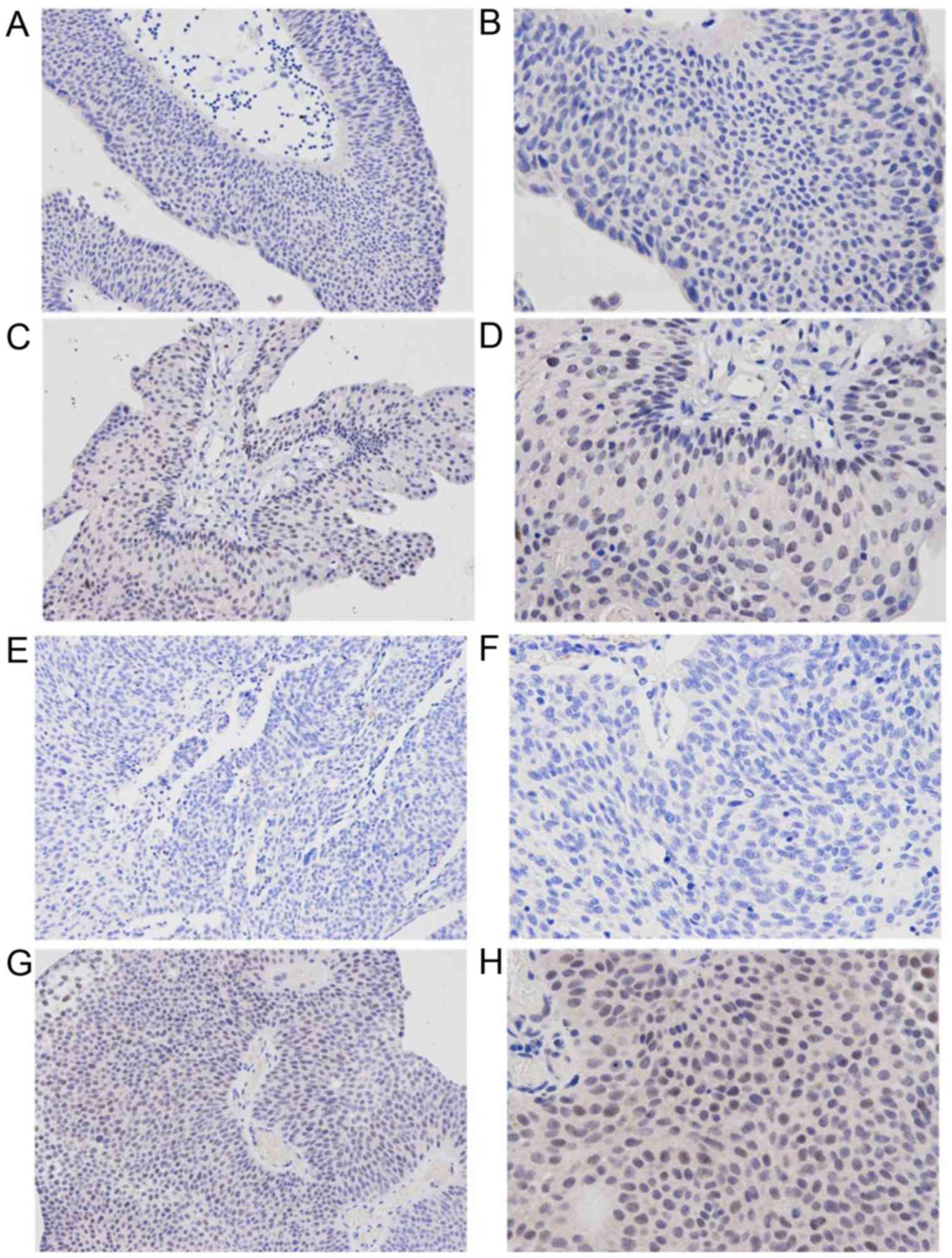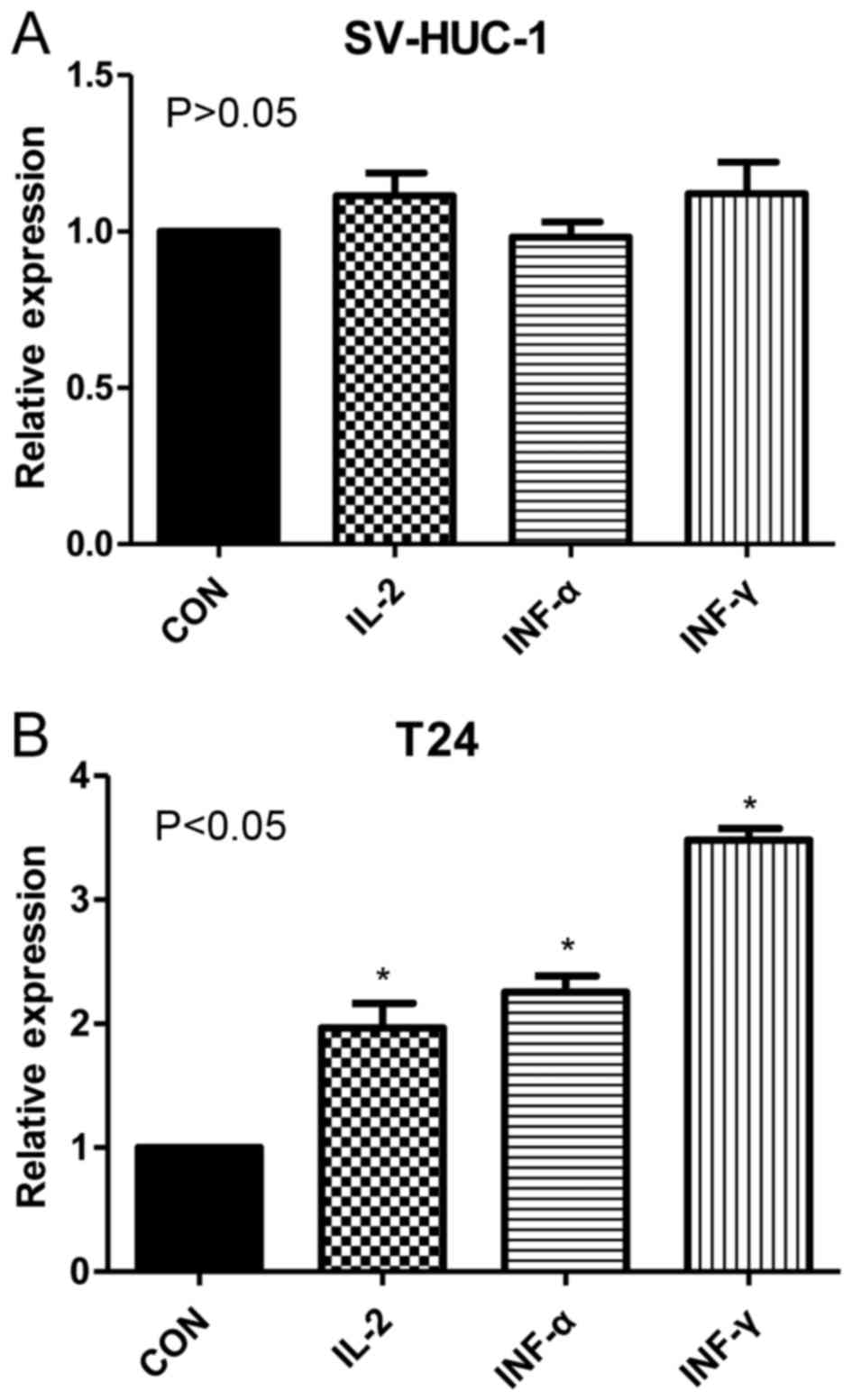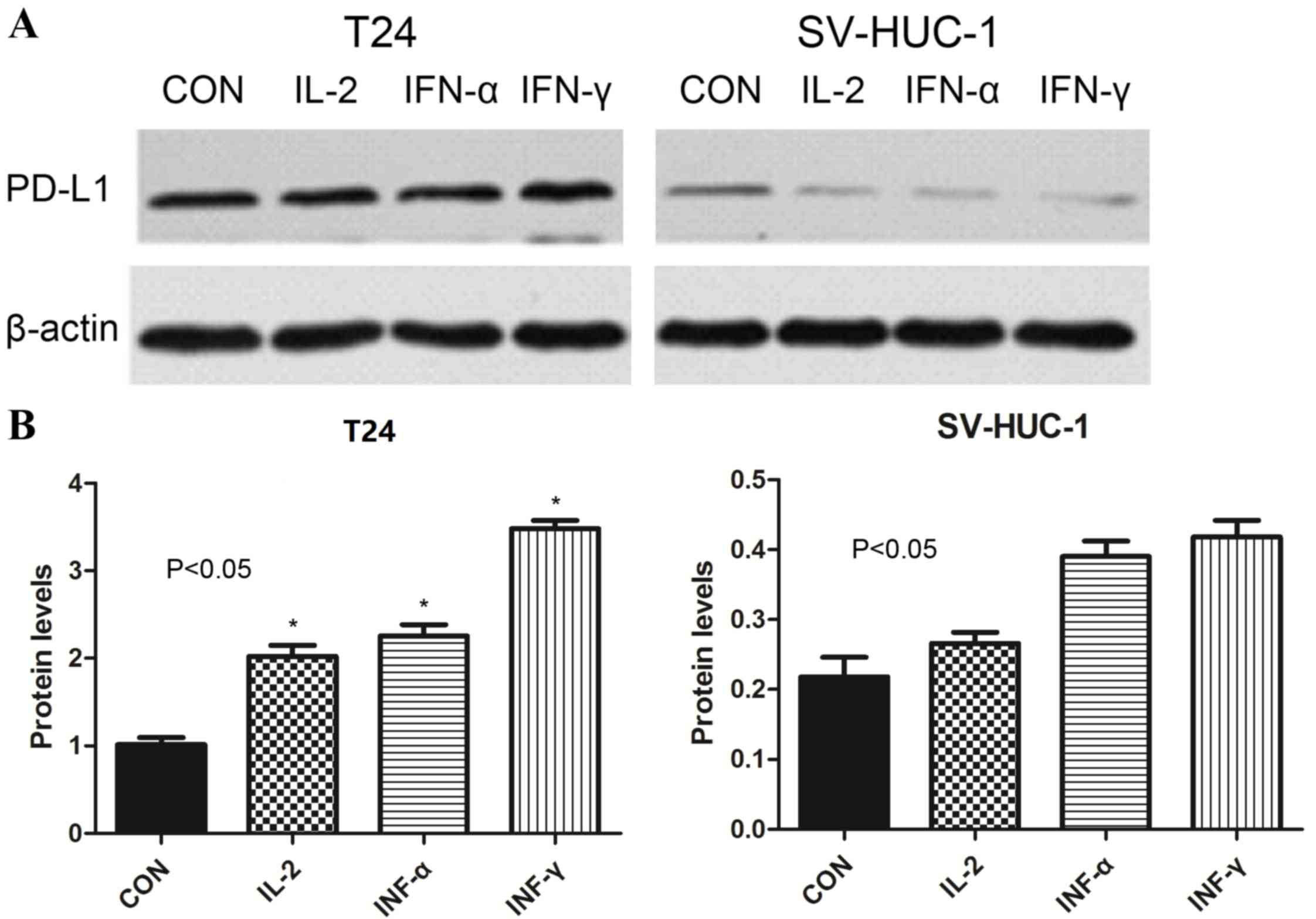|
1
|
Irani J, Bernardini S, Bonnal JL, Chauvet
B, Colombel M, Davin JL, Laurent G, Lebret T, Maidenberg M,
Mazerolles C, et al: Urothelial tumors. Prog Urol. 17:1065–1098.
2007.(In French). View Article : Google Scholar : PubMed/NCBI
|
|
2
|
Milojevic B, Dzamic Z, Kajmakovic B,
Petronic D Milenkovic and Grujicic S Sipetic: Urothelial carcinoma:
Recurrence and risk factors. J BUON. 20:391–398. 2015.PubMed/NCBI
|
|
3
|
Kaufman DS, Shipley WU and Feldman AS:
Bladder cancer. Lancet. 374:239–249. 2009. View Article : Google Scholar : PubMed/NCBI
|
|
4
|
Eifler JB, Scarpato KR and Clark PE:
Management of noninvasive bladder cancers. Curr Opin Oncol.
27:185–190. 2015. View Article : Google Scholar : PubMed/NCBI
|
|
5
|
Seliger B and Quandt D: The expression,
function, and clinical relevance of B7 family members in cancer.
Cancer Immunol Immunother. 61:1327–1341. 2012. View Article : Google Scholar : PubMed/NCBI
|
|
6
|
Shi L, Chen SH, Yang LJ and Li Y: The role
of PD-1 and PD-L1 in T-cell immune suppression in patients with
hematological malignancies. J Hematol Oncol. 6:742013. View Article : Google Scholar : PubMed/NCBI
|
|
7
|
Wada H, Isobe M, Kakimi K, Mizote Y,
Eikawa S, Sato E, Takigawa N, Kiura K, Tsuji K, Iwatsuki K, et al:
Vaccination with NY-ESO-1 overlapping peptides mixed with Picibanil
OK-432 and montanide ISA-51 in patients with cancers expressing the
NY-ESO-1 antigen. J Immunother. 37:84–92. 2014. View Article : Google Scholar : PubMed/NCBI
|
|
8
|
Tano T, Okamoto M, Kan S, Bando T, Goda H,
Nakashiro K, Shimodaira S, Koido S, Homma S, Fujita T, et al:
Immunochemoradiotherapy for patients with oral squamous cell
carcinoma: Augmentation of OK-432-induced helper T cell 1 response
by 5-FU and X-ray irradiation. Neoplasia. 15:805–814. 2013.
View Article : Google Scholar : PubMed/NCBI
|
|
9
|
Nakamoto Y, Mizukoshi E, Kitahara M,
Arihara F, Sakai Y, Kakinoki K, Fujita Y, Marukawa Y, Arai K,
Yamashita T, et al: Prolonged recurrence-free survival following
OK432-stimulated dendritic cell transfer into hepatocellular
carcinoma during transarterial embolization. Clin Exp Immunol.
163:165–177. 2011. View Article : Google Scholar : PubMed/NCBI
|
|
10
|
Yoo C, Do HA, Jeong IG, Park H, Hwang JJ,
Hong JH, Cho JS, Choo MS, Ahn H and Kim CS: Efficacy of dendritic
cells matured early with OK-432 (Picibanil), prostaglandin E2, and
interferon-alpha as a vaccine for a hormone refractory prostate
cancer cell line. J Korean Med Sci. 25:1284–1290. 2010. View Article : Google Scholar : PubMed/NCBI
|
|
11
|
Fujimoto T, Duda RB, Szilvasi A, Chen X,
Mai M and O'Donnell MA: Streptococcal preparation OK-432 is a
potent inducer of IL-12 and a T helper cell 1 dominant state. J
Immunol. 158:5619–5626. 1997.PubMed/NCBI
|
|
12
|
Saito M, Ebina T, Koi M, Yamaguchi T,
Kawade Y and Ishida N: Induction of interferon-gamma in mouse
spleen cells by OK-432, a preparation of Streptococcus pyogenes.
Cell Immunol. 68:187–192. 1982. View Article : Google Scholar : PubMed/NCBI
|
|
13
|
Livak KJ and Schmittgen TD: Analysis of
relative gene expression data using real-time quantitative PCR and
the 2(−Delta Delta C(T)) method. Methods. 25:402–408. 2001.
View Article : Google Scholar : PubMed/NCBI
|
|
14
|
Sylvester RJ, van der Meijden APM,
Oosterlinck W, Witjes JA, Bouffioux C, Denis L, Newling DW and
Kurth K: Predicting recurrence and progression in individual
patients with stage Ta T1 bladder cancer using EORTC risk tables: A
combined analysis of 2596 patients from seven EORTC trials. Eur
Urol. 49:466–477. 2006. View Article : Google Scholar : PubMed/NCBI
|
|
15
|
Alexandroff AB, Nicholson S, Patel PM and
Jackson AM: Recent advances in bacillus Calmette-Guerin
immunotherapy in bladder cancer. Immunotherapy. 2:551–560. 2010.
View Article : Google Scholar : PubMed/NCBI
|
|
16
|
Gandhi NM, Morales A and Lamm DL: Bacillus
Calmette-Guérin immunotherapy for genitourinary cancer. BJU Int.
112:288–297. 2013. View Article : Google Scholar : PubMed/NCBI
|
|
17
|
Babjuk M, Oosterlinck W, Sylvester R,
Kaasinen E, Böhle A and Palou-Redorta J; European Association of
Urology (EAU), : EAU guidelines on non-muscle-invasive urothelial
carcinoma of the bladder. Eur Urol. 54:303–314. 2008. View Article : Google Scholar : PubMed/NCBI
|
|
18
|
Tian K, Han B, Shen Y, Li C and Xuan Y:
Investigation on immune function and chest drainage in patients
with thoracic malignancies using the streptococcal agent Sapylin. J
Cancer Res Ther. 10:1030–1032. 2014. View Article : Google Scholar : PubMed/NCBI
|
|
19
|
Yang Y, Gao E, Liu X, Ye Z, Chen Y, Li Q,
Qu J, Dai X, Wang O, Pan Y and Zhang X: Effectiveness of OK-432
(Sapylin) to reduce seroma formation after axillary lymphadenectomy
for breast cancer. Ann Sur Oncol. 20:1500–1504. 2013. View Article : Google Scholar
|
|
20
|
Matsubara N, Itoh K, Mukai H and Nagai S:
Long-term outcome of pleurodesis with OK-432 in metastatic breast
cancer: A new risk model for success from an analysis of 75 cases.
Int J Clin Oncol. 17:470–476. 2012. View Article : Google Scholar : PubMed/NCBI
|
|
21
|
Liu J, Liu X, Cui F, Chen G, Guan Y and He
J: The efficacy of the inhalation of an aerosolized Group A
streptococcal preparation in the treatment of lung cancer. Chin J
Cancer Res. 24:346–352. 2012. View Article : Google Scholar : PubMed/NCBI
|
|
22
|
Sun XZ and QIU SP: Intravesical
instillation of picibanil in prophylaxis of local recurrence after
resecion of bladder cancer and its mechanism. China Journal of
Modern Medicine. 49–51. 54:2004.
|
|
23
|
Tian YF, Tang K, Guan W, Yang T, Xu H,
Zhuang QY and Ye ZQ: OK-432 suppresses proliferation and metastasis
by tumor associated macrophages in bladder cancer. Asian Pac J
Cancer Prev. 16:4537–4542. 2015. View Article : Google Scholar : PubMed/NCBI
|
|
24
|
Sudo T, Aruga A, Shimizu K, Matsushita N
and Takasaki K: OK432-activated natural killer cells enhanced
trastuzumab (Herceptin (R)-mediated antibody-dependent cellular
cytotoxicity in patients with advanced cancer. Anticancer Res.
26:4327–4333. 2006.PubMed/NCBI
|
|
25
|
Okamoto M, Ohe G, Furuichi S, Nishikawa H,
Oshikawa T, Tano T, Ahmed SU, Yoshida H, Moriya Y, Matsubara S, et
al: Enhancement of anti-tumor immunity by lipoteichoic acid-related
molecule isolated from OK-432, a streptococcal agent, in athymic
nude mice bearing human salivary adenocarcinoma: Role of natural
killer cells. Anticancer Res. 22:3229–3239. 2002.PubMed/NCBI
|
|
26
|
Nakayama F, Iwagaki H, Gouchi A, Hizuta A,
Isozaki H, Takakura N and Tanaka N: Effect of streptococcal lyzate
OK-432 on peripheral blood mononuclear cells in gastric cancer
patients. J Med. 29:199–215. 1998.PubMed/NCBI
|
|
27
|
Dong H, Zhu G, Tamada K and Chen L: B7-H1,
a third member of the B7 family, co-stimulates T-cell proliferation
and interleukin-10 secretion. Nat Med. 5:1365–1369. 1999.
View Article : Google Scholar : PubMed/NCBI
|
|
28
|
Chen C, Qu QX, Huang JA, Zhu YB, Ge Y,
Wang Q and Zhang XG: Expression of programmed-death receptor
ligands 1 and 2 may contribute to the poor stimulatory potential of
murine immature dendritic cells. Immunobiology. 212:159–165. 2007.
View Article : Google Scholar : PubMed/NCBI
|
|
29
|
Huang Y, Zhang SD, McCrudden C, Chan KW,
Lin Y and Kwok HF: The prognostic significance of PD-L1 in bladder
cancer. Oncol Rep. 33:3075–3084. 2015.PubMed/NCBI
|
|
30
|
Huang Y, Zhang SD, McCrudden C, Chan KW,
Lin Y and Kwok HF: The presence of programmed death 1
(PD-1)-positive tumor-infiltrating lymphocytes is associated with
poor prognosis in human breast cancer. Breast Cancer Res Treat.
139:667–676. 2013. View Article : Google Scholar : PubMed/NCBI
|
|
31
|
Maine CJ, Aziz NH, Chatterjee J, Hayford
C, Brewig N, Whilding L, George AJ and Ghaem-Maghami S: Programmed
death ligand-1 over-expression correlates with malignancy and
contributes to immune regulation in ovarian cancer. Cancer Immunol
Immunother. 63:215–224. 2014. View Article : Google Scholar : PubMed/NCBI
|
|
32
|
Afreen S and Dermime S: The
immunoinhibitory B7-H1 molecule as a potential target in cancer:
Killing many birds with one stone. Hematol Oncol Stem Cell Ther.
7:1–17. 2014. View Article : Google Scholar : PubMed/NCBI
|
|
33
|
Inman BA, Sebo TJ, Frigola X, Dong H,
Bergstralh EJ, Frank I, Fradet Y, Lacombe L and Kwon ED: PD-L1
(B7-H1) expression by urothelial carcinoma of bladder and
BCG-induced granulomata: Associations with localized stage
progression. Cancer. 109:1499–1505. 2007. View Article : Google Scholar : PubMed/NCBI
|
|
34
|
Boorjian SA, Sheinin Y, Crispen PL, Farmer
SA, Lohse CM, Kuntz SM, Leibovich BC, Kwon ED and Frank I: T-cell
coregulatory molecule expression in urothelial cell carcinoma:
Clinicopathologic correlations and association with survival. Clin
Cancer Res. 14:4800–4808. 2008. View Article : Google Scholar : PubMed/NCBI
|
|
35
|
Xing L, Ping L, Bo Z, Keqin Z, Fengshuo J
and Yanfeng L: Phenotype and metergasis of dendritic cells from
peripheral blood of bladder carcinoma patients. J Third Mil Med
Univ. 901–904. 2013.
|
|
36
|
Dong HD, Strome SE, Salomao DR, Tamura H,
Hirano F, Flies DB, Roche PC, Lu J, Zhu G, Tamada K, et al:
Tumor-associated B7-H1 promotes T-cell apoptosis: A potential
mechanism of immune evasion. Nat Med. 8:793–800. 2002. View Article : Google Scholar : PubMed/NCBI
|
|
37
|
Keir ME, Butte MJ, Freeman GJ and Sharpe
AH: PD-1 and its ligands in tolerance and immunity. Annu Rev
Immunol. 26:677–704. 2008. View Article : Google Scholar : PubMed/NCBI
|
|
38
|
Dunn GP, Koebel CM and Schreiber RD:
Interferons, immunity and cancer immunoediting. Nat Rev Immunol.
6:836–848. 2006. View
Article : Google Scholar : PubMed/NCBI
|
|
39
|
Liu JZ, Hamrouni A, Wolowiec D, Coiteux V,
Kuliczkowski K, Hetuin D, Saudemont A and Quesnel B: Plasma cells
from multiple myeloma patients express B7-H1 (PD-L1) and increase
expression after stimulation with IFN-{gamma} and TLR ligands via a
MyD88-, TRAF6-, and MEK-dependent pathway. Blood. 110:296–304.
2007. View Article : Google Scholar : PubMed/NCBI
|
|
40
|
Parsa AT, Waldron JS, Panner A, Crane CA,
Parney IF, Barry JJ, Cachola KE, Murray JC, Tihan T, Jensen MC, et
al: Loss of tumor suppressor PTEN function increases B7-H1
expression and immunoresistance in glioma. Nat Med. 13:84–88. 2007.
View Article : Google Scholar : PubMed/NCBI
|
|
41
|
Camisaschi C, Filipazzi P, Tazzari M,
Casati C, Beretta V, Pilla L, Patuzzo R, Maurichi A, Cova A, Maio
M, et al: Effects of cyclophosphamide and IL-2 on regulatory CD4+ T
cell frequency and function in melanoma patients vaccinated with
HLA-class I peptides: Impact on the antigen-specific T cell
response. Cancer Immunol Immunother. 62:897–908. 2013. View Article : Google Scholar : PubMed/NCBI
|

















